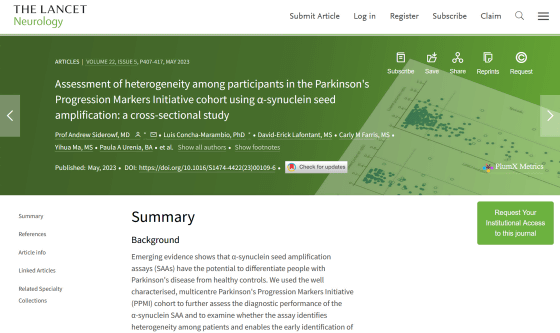Research team supported by Michael J. Fox foundation announces breakthrough leading to early diagnosis of Parkinson's disease

Actor
Assessment of heterogeneity among participants in the Parkinson's Progression Markers Initiative cohort using α-synuclein seed amplification: a cross-sectional study - The Lancet Neurology
https://doi.org/10.1016/S1474-4422(23)00109-6

The Lancet Neurology: Identifying 'hallmark' | EurekAlert!
https://www.eurekalert.org/news-releases/985529
Michael J. Fox Foundation Announces Significant Breakthrough in Search for Parkinson's Biomarker | Parkinson's Disease
https://www.michaeljfox.org/publication/michael-j-fox-foundation-announces-significant-breakthrough-search-parkinsons-biomarker
Parkinson's disease is a progressive neurodegenerative disease that is thought to be caused mainly by degeneration of dopamine- secreting cells in the brain. Although several causative genes have been identified, many cases develop regardless of genes. matter. It is a disease that gradually progresses over several decades, but early diagnosis of Parkinson's disease is possible because it is possible to extend the period when you can live as usual by starting treatment early. saves many potential patients.
Abnormal accumulation of a protein called α-synuclein in the brain has been identified as a pathological feature of such Parkinson's disease. In a previous study, patients with Parkinson's disease were detected by a method called 'α-synuclein seed amplification assay (αSyn-SAA / α-synuclein seed amplification analysis)', which amplifies and measures α-synuclein in samples collected from patients. It was shown to identify, but no detailed studies involving large subjects were conducted.
Therefore, the research team of the Parkinson's Progression Markers Initiative (PPMI: Parkinson's Disease Progression Markers Initiative) , which is funded by the Michael J. Fox Parkinson's Disease Research Foundation, conducted a large-scale study of a total of 1123 subjects. The we.
Subjects included pre-diagnosed Parkinson's disease, healthy individuals without Parkinson's disease, and individuals with one of two Parkinson's disease-associated gene mutations ( GBA or LRRK2 ). rice field. In addition, although there were sleep disorders and olfactory disorders, which are early signs of Parkinson's disease, there were people who were not diagnosed with Parkinson's disease because they did not see movement disorders such as hand tremors.

The research team collected
In addition, 93% of patients without genetic factors that increase the incidence of Parkinson's disease had a positive α-synuclein seed amplification assay, compared with 96% of those with GBA and 68% with LRRK2 gene mutations. It is said that there was a change depending on the type of In contrast, 9% of subjects with LRRK2 but without signs of Parkinson's disease were positive, compared with 7% with LRRK2.
Most of the subjects with early signs who were not diagnosed with Parkinson's disease were also positive, especially 89% of those with early signs who reported loss of smell and 85 of those with REM sleep behavior disorder. % were positive. Loss of smell was the most likely predictor of positive alpha-synuclein seed amplification assays, with 97% of Parkinson's disease patients with loss of smell positive compared to no loss of smell The positive rate among Parkinson's disease patients was 63%.
Paper co-author Tanya Simuni, Ph.D., of Northwestern University, said: 'Although decreased olfaction is thought to be a strong predictor of Parkinson's disease, in this study even a positive alpha-synuclein seed amplification assay It is important to note that we identified individuals who did not have a reduced sense of smell, indicating that alpha-synuclein lesions may be present before the reduced sense of smell is measurable.' said.

Lead author of the paper, Professor Andrew Siderowf of the University of Pennsylvania School of Medicine, said: 'Identifying effective biomarkers of Parkinson's disease pathology could have a significant impact on the treatment of Parkinson's disease. Early diagnosis is possible. It may also enable us to identify the optimal treatment for each patient and speed up clinical trials.'
'Our results show that misfolded alpha-synuclein is detected before dopaminergic impairment in the brain is observed,' said co-first author Luis Concha, director of development at medical company Amprion. It shows that,' he said. Amprion has commercialized an alpha-synuclein seed amplification assay tool that physicians can use to diagnose Parkinson's disease.
“I am involved with the Foundation in many ways, but first and foremost, as a Parkinson's patient, I am deeply touched by this groundbreaking achievement,” said Michael J. Fox. And I am infinitely grateful to the researchers, research participants, and funders who have worked so hard.'
Related Posts:
in Science, Posted by log1h_ik







